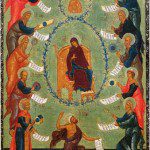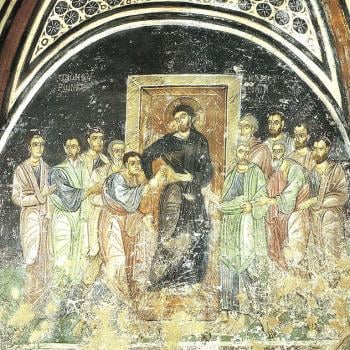Hope is not about chances. When talking about hope we do not know anything about chances but rather, we have an end we are working for. We know our desire. Love desires that which is good for the beloved. We are to love our neighbors as ourselves. We hope for our salvation, indeed, we desire our own salvation. We must then hope for the salvation of our neighbors, not because we necessarily believe they will be saved, but because love desires that good for them. And we must not go into the question of how difficult it is for our hope to be fulfilled. It might indeed seem impossible. But Jesus made it clear: “Jesus looked at them and said, ‘With men it is impossible, but not with God; for all things are possible with God’” (Mk. 10:27 RSV). This is why we pray for all the lost, because we hope for their salvation.[1]
When we try to reason out how few are saved because of the chances we give their conversion, we have turned astray, turning our eyes away from God and unto our own speculations. If we rely upon mere chance, no one is saved, for salvation is not from chance, but by the work and grace of God. This is where St. Augustine is correct; without grace, no one can be saved. It is how Augustine viewed God’s imposition of will which caused him to misunderstand our relationship with grace, leading to a denial of the human will working with the divine will that is necessary for salvation. With the view established by Augustine, the whole missionary objective can easily be brought into question. Why do we seek to spread the Gospel if God’s will to save has nothing to do with us and what we do, nor with others and what they do, but due only to God’s unknown and undecipherable will? Those who will be saved will be saved, they are of the city of God, chosen by God, while those who will be damned will be damned, no matter what we or they do, and so they are of the devil and belong to perdition. When we have no hope for success, because it has nothing to do with us, there is no reason for mission work. This is why, contrary to the way many think the hope works, this hope motivates us to work for evangelization. The belief in the salvation of only a few specifically chosen by God undermines the zeal needed for missions, while the hope that all can be saved justifies the missionary work, because we have the basis to believe missions can be effective and help people to open up to God and respond to him in love.
Certainly, there are many texts in Scripture which hint at perdition. Jesus warned several times of the possibility of hell, and that indeed, that perdition can be wide spread. Yet, Scripture also talks about the universal work and will of Jesus for the salvation of all. The warning must be seen in that light. We do not know the eschaton, we do not know who will be damned, if any, though we do know we can be among the damned. We must fear perdition and so open ourselves up to God and his grace. We must cooperate with grace and not resist it. Wherever grace is, the possibility of such cooperation is there; when it is denied, and so the seed of enlightenment is rejected, then and only then is perdition possible – but who actually has snuffed out grace? We do not know. We should hope that no one will. But we must fear we, in our sin, might indeed be the one. We must struggle for our own salvation while preaching the saving love of God for all. It is good news which we must spread, but good news that is based upon the possibility of something bad happening if we do not heed the news, something which would have happened to us all had it not been for the work of Jesus Christ.
![Michelangelo [Public domain], via Wikimedia Commons](https://wp-media.patheos.com/blogs/sites/637/2016/09/Sistine_jonah-254x300.jpg)
[1] The Catechism makes this point, “1058 The Church prays that no one should be lost: “Lord, let me never be parted from you.” If it is true that no one can save himself, it is also true that God “desires all men to be saved” (1 Tim 2:4), and that for him “all things are possible” (Mt 19:26).” The Catechism of the Catholic Church. Vatican Translation. http://www.vatican.va/archive/ccc_css/archive/catechism/p123a12.htm
Stay in touch! Like A Little Bit of Nothing on Facebook:
A Little Bit of Nothing













